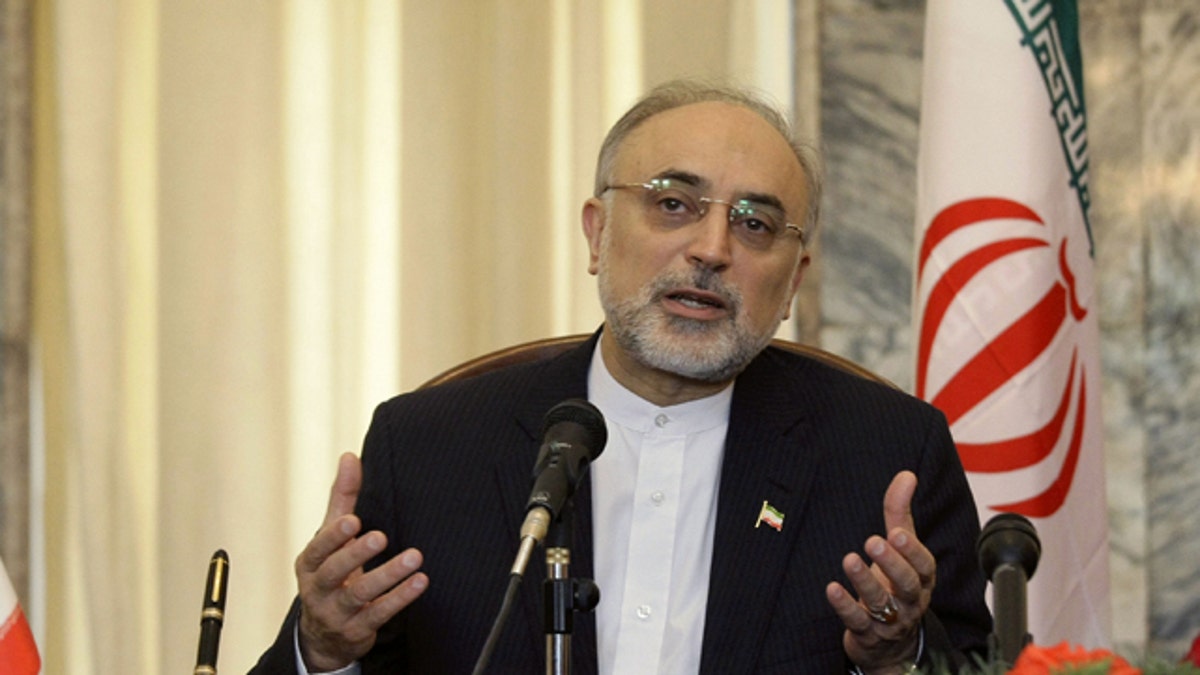
Sept. 5, 2012: Iranian Foreign Minister Ali Akbar Salehi speaks during a joint press conference with his Afghan counterpart Zalmai Rasool, unseen, in Kabul, Afghanistan. (AP)
Iran’s foreign minister is hoping to address a number of prestigious policy groups during a trip to New York next month, over the objections of critics who say it’s not the time to roll out the red carpet and provide a podium for the Iranian regime’s vitriol.
The Council on Foreign Relations (CFR) confirmed that Ali Akbar Salehi is slated to appear Oct. 1 at the group’s office in Manhattan, according to CFR spokesman Kendra Davidson. The event will likely consist of Salehi delivering prepared remarks, followed by a question-and-answer session with CFR members that may or may not be open to the media.
[pullquote]
Salehi is also in talks to appear at events hosted by the Carnegie Council for Ethics in International Affairs and the Asia Society, though neither appearance has been confirmed, according to officials with each group. Salehi is set to appear at the annual opening of the United Nations General Assembly, ostensibly the reason for his New York trip.
While some welcome the opportunity to hear directly from a high-ranking Iranian official, news of Salehi’s planned appearances has drawn sharp criticism from others who argue Iran should be isolated by the international community.
“It’s always good to hear somebody out and engage in dialogue, but in this case, we know what he has to say and it’s nothing new,” said Abraham Foxman, National Director of the Anti-Defamation League (ADL). “What it does, in effect, is it gives him a certain legitimacy, a certain mainstreaming. At the very least, this is a country that should be made a pariah in civilized society.”
This wouldn’t be the first time an Iranian official made headlines while speaking to a New York audience. President Mahmoud Ahmadinejad drew protests and widespread jeers in a 2007 appearance at Columbia University in 2007, where he infamously questioned whether the Holocaust actually happened and proclaimed there are no homosexuals in Iran.
Foxman said Salehi’s appearance at the U.N. — a courtesy accorded visiting dignitaries from member states — doesn’t qualify him as a guest of respectable organizations to provide a forum for a nation the U.S. considers a sponsor of terrorism.
“There’s no obligation for them to give him a red-carpet welcome,” said Foxman. “We should not bring him into our home, someone who publicly threatens the destruction of another sovereign state who happens to be our ally. What does he have to say to us? What message will he explain to us?”
Shahin Gobadi, a spokesman for the Paris-based National Council of Resistance of Iran, told FoxNews.com that providing these kinds of forums to Iranian officials like Salehi and Ahmadinejad have historically shown to be counterproductive.
“Given the mullahs' appalling human rights record, including the execution of 120,000 political dissidents, primarily members and supporters of the People's Mojahedin organization of Iran, the unabated pursuit of nuclear weapons, the export of Islamic fundamentalism and terrorism, and interfering in affairs of other countries, as it is abundantly clear in Tehran's support for Assad's brutal dictatorial regime, the only policy should be further isolation of the mullahs' regime,” Gobadi wrote in an email.
Others were less critical of the scheduled event, saying discussion might lead to better understanding between Iran and its critics.
“I’m of the opinion that it’s best to let people speak and listen to their ideas and to rebut them,” said Larry Korb, senior fellow at the Center for American Progress and a former assistant secretary of defense during the Reagan administration. “I do think it’s important to get these things out there. When you deal with these people, their arguments get undermined.
“We can use the Iranian help to stabilize Afghanistan,” he said. “We have a common interest in making sure Afghanistan remains stable. We could also use their help in Syria — I don’t know if we’ll ever get it.”
Justin Logan, director of foreign policy studies at Cato Institute, a Washington-based think tank, said the most potentially interesting comments by Salehi would come during a question-and-answer session rather than during prepared remarks.
Asked what question he’d pose to Salehi, Logan referred to the country’s nuclear program and replied: “Is there any prospect for a deal at all?”
But others like Kenneth Timmerman, president and CEO of the Foundation for Democracy in Iran, were less than hopeful.
“A constructive dialogue? What a joke,” he said. “The only negotiations the Iranians are seeking are the size of the coffins in which they’ll bury us. I think it’s disgraceful that the Council on Foreign Relations would invite the Iranian foreign minister.”
